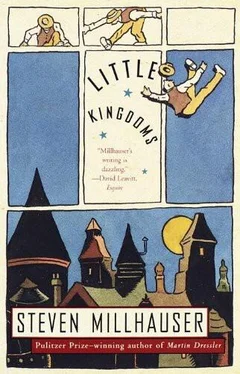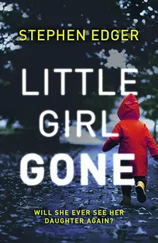“Ah, there they are!” cried Max, breaking away and bounding down the steps. Cora, in a shimmering green sleeveless dress with a long transparent scarf flowing down her side, followed slowly. Max seized Franklin by the elbow. “We thought you’d drowned. Everyone’s here. And who’s this? Please introduce me to the princess. No — I don’t believe it. You don’t mean to tell me. It can’t be … Stella?
Stella
You’re so bella
You make a guy feeeel
Like one heck of a fella.
Oh Cora, I’d like you to meet a friend of mine: Franklin Payne. You’ve met? Over here, Milt, over here. Milt Crane: man who drew up your contract. There’s not a thing he doesn’t know about the business. We’re very hopeful, Franklin, very hopeful. Drinks are on the porch. Lemonade or strawberry punch for the princess, and you can water yours down with a little high-class hooch. Excuse me. A little crisis over there. Cora, would you mind? Excuse us for just a second.”
Franklin wandered onto the porch with Stella, where he poured lemonade for her from a big pitcher into a tall glass. An expressionless man in a red dinner jacket and black pants held out a silver tray of little triangular sandwiches with toothpicks in them as a man with wavy gray hair, wearing a white dinner jacket, said, “Franklin Payne, isn’t it? Max introduced us.” “I’m afraid I,” Franklin said, looking for his drink and remembering that he’d forgotten to pour one, and all at once recalling the man under the towel. “Not the Franklin Payne?” a woman said; she had bare shoulders and on one shoulder lay a tiny shimmering drop of liquid. “The other one, I think,” Franklin said. He looked about for Stella, who seemed to have disappeared. He heard a shriek and turned violently; down on the crowded lawn a woman was brushing furiously at her dress as a man held out a handkerchief. Through the trees he could see glimpses of river and, far downstream, the village of Mount Hebron and his tiny house with its tiny tower. “Excuse me,” Franklin said, “I’ve misplaced someone.” She wasn’t on the porch; on the lawn he saw a green dress and made his way down to it. “I can’t find Stella.” Cora said, “I thought she was with you.” With a swift glance she took in the lawn and porch. “I’m sure she’ll be all right, Franklin. I’ll help you look for her in just a minute.”
He found her in the depths of the house, in a large leather chair in a dark study. Through the partly open blinds was a darkness of trees and patches of dusky sky. “I’ve been looking for you,” Franklin said. “Well,” Stella said, “here I am.” “Yes, you are. What’re you doing in the dark? Don’t you like the party?” “I’m just sitting here. You’re not supposed to ask two questions, you know. Can we go home soon?” “Pretty soon,” Franklin said, sitting down on the floor and leaning back against the side of the chair. He felt a hand shaking his shoulder and opened his eyes to see Max bending over him in bright electric light. “We’ve been looking all over for you,” Max said. Franklin said, “Is this a dream?” His neck hurt; Stella was asleep in the chair. Then he was handing Cora her shawl and Max was holding a flashlight as he led them to the car. The ferry had stopped running an hour ago, and while Stella slept in the backseat and Cora sat with closed eyes in the front seat, Franklin drove slowly over a bumpy dirt road to the nearest bridge crossing, ten miles away.
Despite Max’s assurance that Toys at Midnight was perfect — perfect — Franklin insisted on a screening. The flicker was unmistakable, but except for one short sequence that needed fixing, oddly satisfactory: the effect of a slight continual tremor, of a black-and-white shot-silk iridescence, charged the images with the shimmer of dream. Franklin was pleased with the episode in the nightmare subway when the enlarging train appeared to be coming out of the dark directly at the audience, closer and closer, until it seemed ready to burst from the screen, though he was now bothered by the transformation in the candy store. On the whole he was less disappointed than he had expected to be, and hoped to iron out the rough spots in a few months.
“I can’t believe I’m hearing this,” Max said. “All right, all right: now listen to me. You can have one month — thirty days — and not a billionth of a second more. We’ve got a tight production schedule and you’ll gum up the works with your crazy fussing. Christ almighty, Franklin. Shakespeare wrote Hamlet in ten minutes on the back of a grocery list and Beethoven wrote the entire Ninth Symphony while eating a bowl of Post Toasties Corn Flakes, and you need two years to tinker with a cartoon. Is this just? Thirty days: I’m warning you.”
Franklin, who had been feeling idle and restless since delivering up his boxes of drawings, took up Max’s challenge almost gratefully. On weekday nights he worked four-hour stretches in the tower study, coming down only to read Stella a bedtime story at half-past nine; and on the weekends, which Max now spent at his new house, Franklin was able to work in the mornings and afternoons, while Stella sat sketching in a corner of the study and Cora and Max went shopping or rode through the countryside in Max’s new Peerless. Sometimes Franklin stopped work and, turning to Stella, offered to take a walk down to the river or play croquet; but she, looking at him gravely, said that he wasn’t allowed to play until he finished his work. Then Franklin, tired and joyful, returned to his task; and at dinner, which took place sometimes at his house and sometimes at Max’s, he had the sense that he had fallen asleep at his desk and was dreaming this moment, with its steaming ears of buttered corn, its big shining pots in the kitchen, its summer sky darkening to dusk outside the windows and the shadows rising on the sun-topped trees.
Franklin finished in twenty-nine days; on the thirtieth, a Sunday, he took Stella to the circus in a nearby town. He had hoped to make it a family outing, but Cora begged off with a headache. The clown with his three tufts of orange hair jumped from the burning building, the tightrope walker in spangled blue tights rode a unicycle across the high wire, the balloon man and the popcorn man and the man selling live chameleons walked up and down the steep aisles between the wooden benches stretching up and up, while Stella watched with tense, held-in excitement and Franklin watched Stella watching and worried about Cora’s headache. She had been having a lot of them recently, but she refused to see Dr. Shawcross, and that night after dinner, as he handed three new boxes of drawings over to Max, who agreed to let Franklin view it one more time but refused to allow a single additional change, he saw, in the smooth space between Cora’s eyebrows, two shadowy lines of strain.
In the morning Cora laughed her old laugh and said that her headache had lifted. Franklin, despite her laughter, seemed to see the same shadowy lines between her eyebrows, and on a Saturday afternoon two weeks later when he happened to glance at her, seated between him and Max in a darkening movie theater, he thought he saw the same shadowy lines, as if she had a slight perpetual frown. The newsreel and travelogue barely held his attention, though he found Toys at Midnight interesting enough. He noted several flaws, was pleased by the night storm and the rings of rain-haze about the lampposts, and in general had the slightly confusing but not unpleasant sense that, thrown up on the big screen before an audience, none of it any longer had anything to do with him. They left after the first film of the double feature, a cloak-and-sword adventure, and as Franklin pushed open the heavy doors he stopped in confusion as he saw not the dark autumn night but the brilliant afternoon sunlight shining through the glass doors, flashing on the glass-covered lobby posters, polishing the silver posts, lying in warm parallelograms on the crimson rug.
Читать дальше












